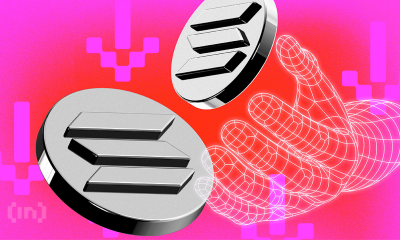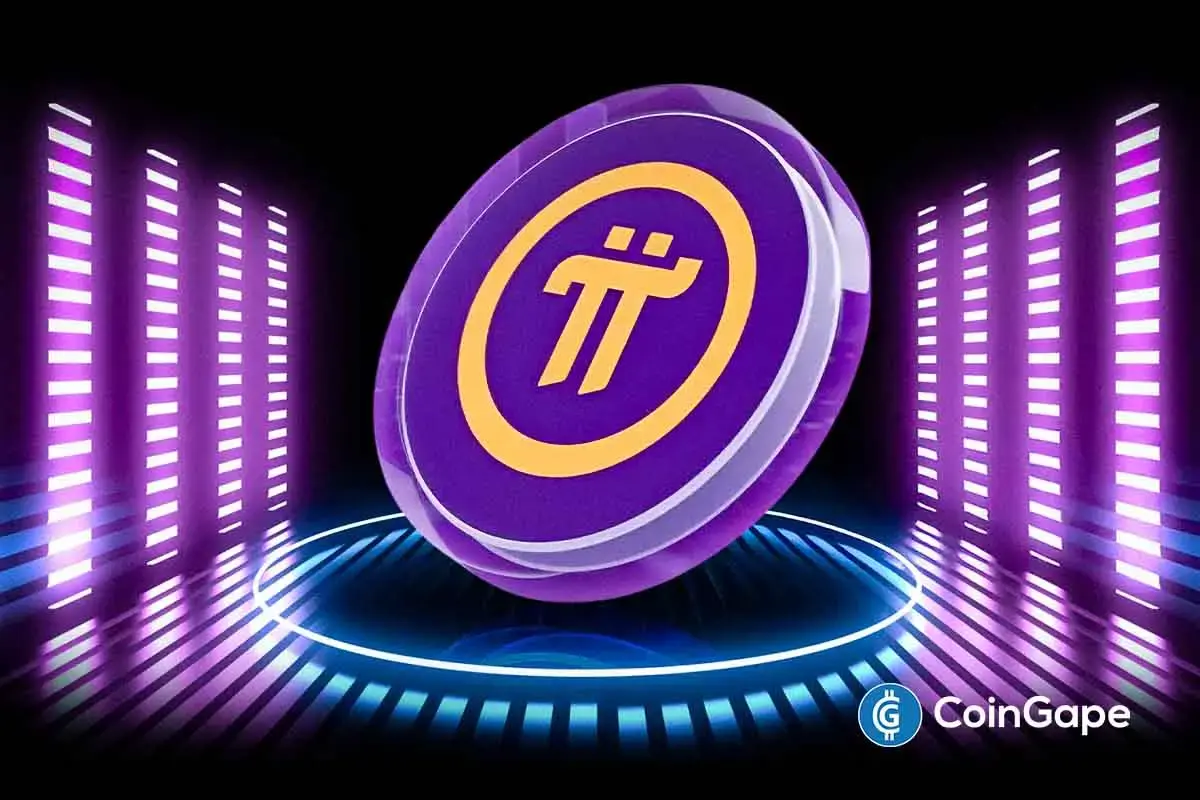Market
600,000 Potential KYC Violations Uncovered


South Korea’s Financial Intelligence Unit (FIU), part of the Financial Services Commission (FSC), uncovered a staggering 500,000 to 600,000 suspected violations of Know Your Customer (KYC) requirements at Upbit, the country’s largest cryptocurrency exchange.
The discovery comes during a meticulous review of Upbit’s business license renewal application, raising concerns about potential legal and regulatory ramifications.
Potential KYC Violations on Upbit
Local media reported that according to sources within South Korea’s financial sector, the FIU’s findings were the result of an intensive inspection that began in late August. The violations pertain to lapses in Upbit’s customer verification processes, a crucial component of anti-money laundering (AML) and counter-terrorist financing (CTF) measures.
Examples of breaches include accounts being approved despite incomplete or blurred identification documents. According to the financial regulator, this could facilitate illicit activities such as money laundering.
An official from Upbit reportedly refrained from commenting on the FIU’s ongoing review, citing confidentiality clauses. However, the exchange’s operational future hangs in the balance as financial authorities verify the validity of the flagged cases. Potential fines of up to 100 million won (approximately $75,000) per violation loom.
This is not the first time Upbit has been scrutinized. South Korean authorities have consistently monitored the exchange due to its dominant position in the local crypto market. Of note is that it is the largest trading volume in the South Asian region.
As BeInCrypto reported, South Korean lawmakers recently opened an investigation against Upbit. The probe centered on the monopoly structure of the virtual asset market built around the trading platform. Similarly, listings on Upbit have been known to cause significant market fluctuations, leading to questions about transparency and fair practices.
Upbit Listings Remain Controversial
Recently, Upbit’s move to expand the Uniswap (UNI) trading pair caused a 150% volume spike for the decentralized exchange token. Similarly, the exchange’s popularity boosted Cat in a Dogs World (MEW) to a new peak, also following trading pair expansion. Other tokens that have benefited from trading activities on Upbit include Injective (INJ) and real-world asset (RWA) token Ondo Finance (ONDO).
Nevertheless, it is impossible to ignore the prevalence of South Korean traders engaging in “pump and dump” schemes, particularly for altcoins. As noted by CryptoQuant CEO Ki Yong Ju, some traders exploit Upbit’s listings to artificially inflate token prices before selling them off, leaving other investors at a loss.
“Korean crypto traders love pumping & dumping altcoins, ironically,” Young Ju noted, demonstrating with a video.
In addition, traders tend to exploit the Kimchi premium, a price gap between South Korean and overseas exchanges. While these practices are not directly linked to Upbit’s management, the exchange’s listings wield an undeniable influence on the market.
Meanwhile, even in the face of ongoing regulatory challenges, Upbit has recently taken steps to enhance transparency and user protection. In July, the exchange issued its first public disclosure under the newly enacted Virtual Asset User Protection Act. This testified to Upbit’s financial stability, user asset holdings, and risk management practices, reflecting an effort to align with changing regulatory standards.
Additionally, Upbit has made strides in global compliance. In January, it secured a Digital Payment Token Services License from Singapore’s Monetary Authority of Singapore (MAS). This milestone followed an earlier conditional approval from the same regulator. The license reflects Upbit’s commitment to regulatory adherence in international markets, even as it faces scrutiny at home.
Notwithstanding, the FIU’s findings could have far-reaching implications for Upbit, both domestically and internationally. While the financial watchdog has yet to announce definitive conclusions, the scale of potential violations could result in hefty fines.
Furthermore, besides reputation damage, the case may prompt broader discussions about KYC practices and regulatory compliance across South Korea’s growing crypto sector. Upbit’s influence as a market leader makes its actions particularly significant. Beyond dominating South Korea’s trading volume, Upbit also shapes trends and token adoption rates.
Disclaimer
In adherence to the Trust Project guidelines, BeInCrypto is committed to unbiased, transparent reporting. This news article aims to provide accurate, timely information. However, readers are advised to verify facts independently and consult with a professional before making any decisions based on this content. Please note that our Terms and Conditions, Privacy Policy, and Disclaimers have been updated.
Market
Bitcoin Price Drops Below $80,000 Amid Heavy Weekend Selloff

Bitcoin fell below the $80,000 mark on Sunday as investor sentiment weakened across global markets. The move came alongside a spike in daily liquidations, which totaled $590 million.
Heightened anxiety over former President Donald Trump’s proposed tariffs and escalating geopolitical tensions weighed heavily on risk assets.
More Traders are Shorting Bitcoin After the Worst Q1 In a Decade
The long-short ratio for Bitcoin dropped to 0.89, with short positions now accounting for nearly 53% of activity. The shift reflects growing skepticism about Bitcoin’s short-term direction.
Traditional markets also suffered sharp losses. The Nasdaq 100, S&P 500, and Dow Jones all entered correction territory last week, posting their worst weekly performance since 2020.

Bitcoin closed the first quarter with a loss of 11.7%, making it the weakest Q1 since 2014.
The broader crypto market lost 2.45% on Sunday, reducing total market capitalization to $2.59 trillion. Bitcoin remains the dominant asset, holding 62% of the market share. Ethereum follows with 8%.
Sunday’s selloff triggered $252.79 million in crypto derivatives liquidations. Long positions made up the bulk of that figure at $207 million. Ethereum traders accounted for about $72 million in long liquidations alone.
Bitcoin’s price remains closely tied to shifts in global liquidity, often reflecting broader macro trends. With U.S. markets set to open Monday, this weekend’s activity signals continued volatility ahead.

Investors may face more pressure after Federal Reserve Chair Jerome Powell warned that Trump’s tariff plans could push inflation higher while slowing economic growth.
That combination raises the risk of stagflation, a situation where policy tools become less effective. Efforts to stimulate the economy can worsen inflation, while measures to control prices can limit growth.
Disclaimer
In adherence to the Trust Project guidelines, BeInCrypto is committed to unbiased, transparent reporting. This news article aims to provide accurate, timely information. However, readers are advised to verify facts independently and consult with a professional before making any decisions based on this content. Please note that our Terms and Conditions, Privacy Policy, and Disclaimers have been updated.
Market
Avalanche Price Holds Under $20, Low Selling Can’t Lift Price

Avalanche (AVAX) price has been unable to reclaim the $20.00 support level after falling through it in the recent correction. The altcoin is now trading well below that key mark despite a noticeable decline in selling pressure.
However, bullish momentum has not been strong enough to counter prevailing bearish cues.
Avalanche Investors Are Not Selling
Analyzing the active address profitability reveals that less than 3% of current participants are in profit. This data highlights a crucial detail: most AVAX holders are unwilling to sell at a loss. Instead, they appear to be HODLing in anticipation of a recovery. This lack of selling is a bullish indicator.
The patience shown by investors during this downturn could help Avalanche establish a stronger base once broader market conditions stabilize. As fewer holders are actively selling, downward pressure on AVAX’s price is reduced. Given the right market catalysts, this opens a window for the altcoin to bounce back.

Despite low selling activity, the technical indicators continue to signal weakness. The Relative Strength Index (RSI) has dropped back into the bearish zone after a brief recovery attempt. This suggests a lack of buying pressure and continued uncertainty among investors.
Market support has been lacking for AVAX in recent sessions, preventing a meaningful rebound. The altcoin is facing consistent resistance and has failed to generate strong upward momentum.
The RSI trend reinforces that the macro environment is still leaning bearish, keeping Avalanche subdued.
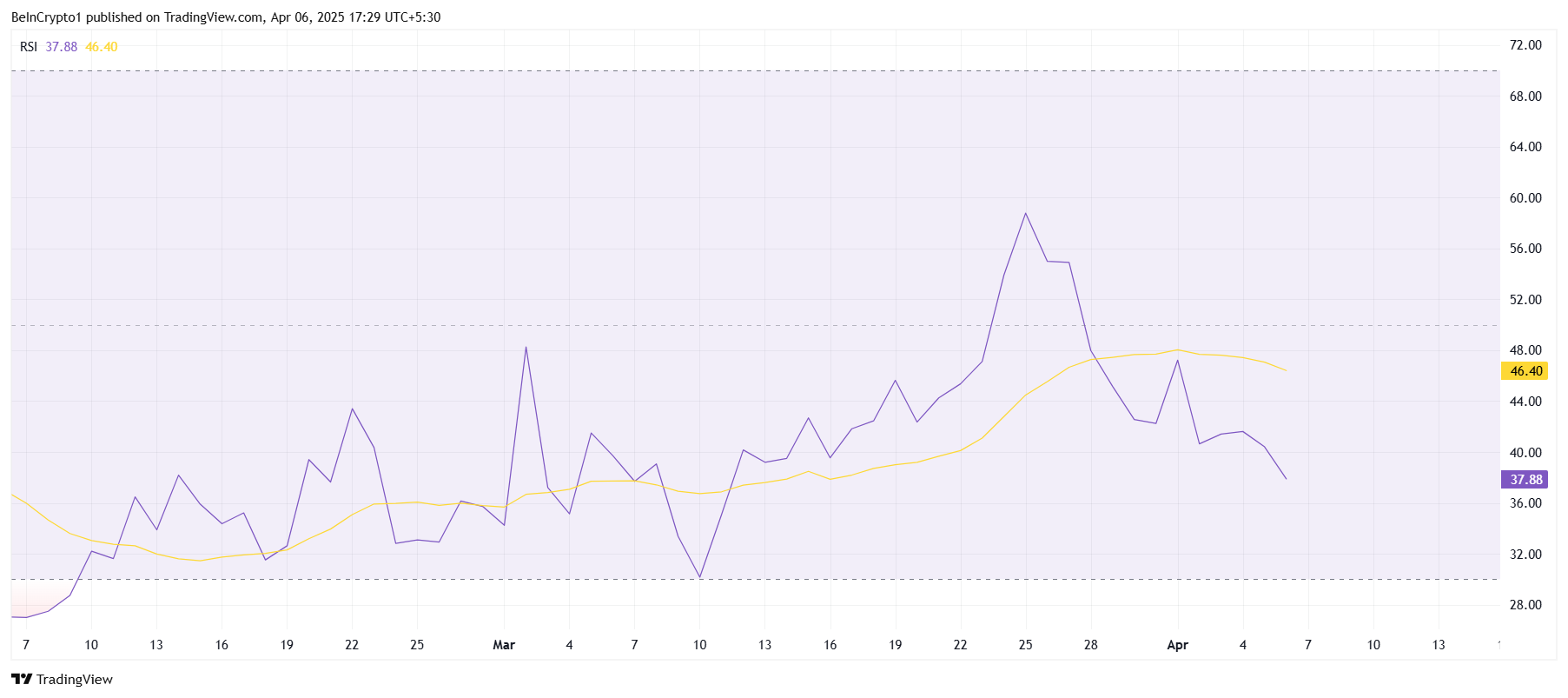
AVAX Price Is Vulnerable
Avalanche is currently priced at $17.19, marking a 25% decline over the past two weeks. The sharp drop came after AVAX failed to break through the $22.87 resistance level. This rejection led to the current consolidation below $20.00, with bulls unable to reverse the trend.
Given the existing market cues, Avalanche may struggle to reclaim $18.27 as a support level. If the altcoin fails to secure this level, it risks dropping further to $16.25. This would deepen investor losses and delay any chances of recovery.
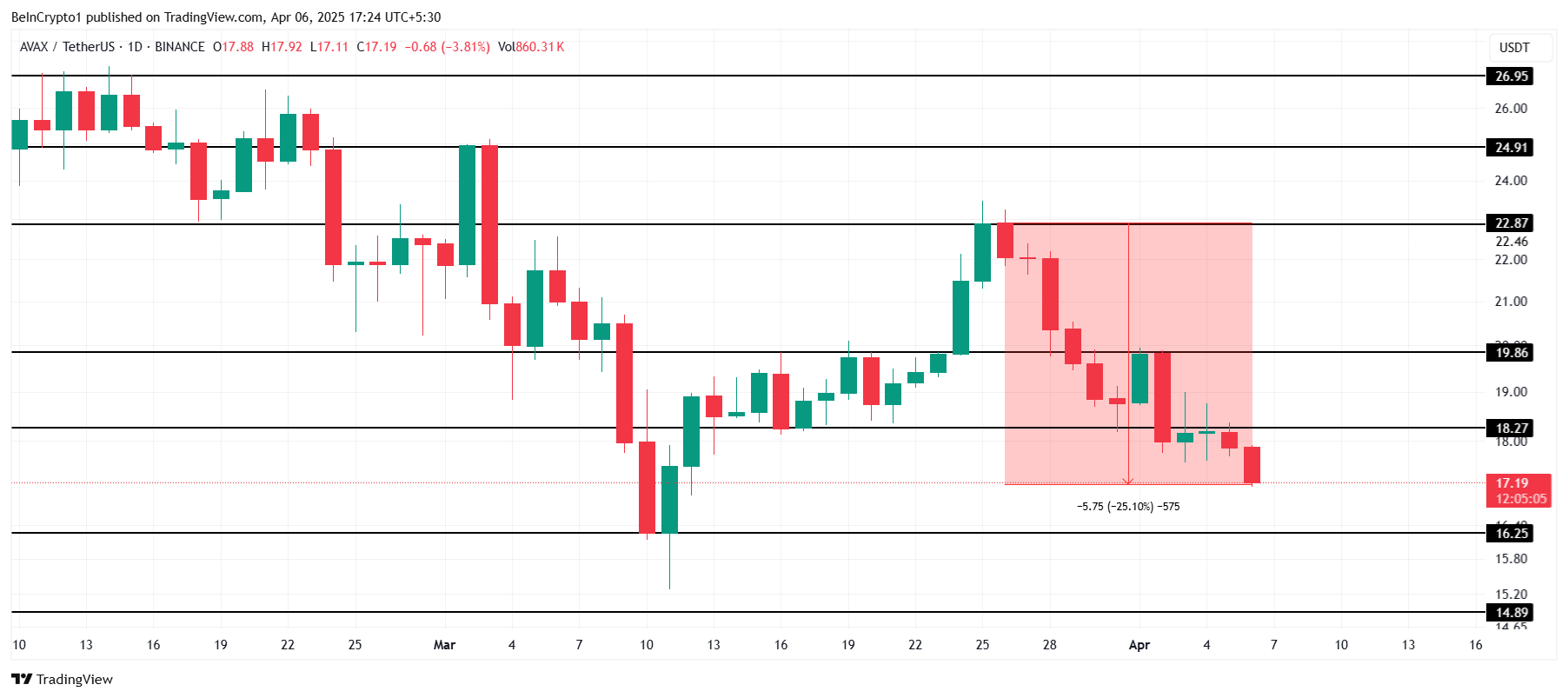
On the upside, a key shift would occur if AVAX can flip $19.86 into support. This would suggest strengthening bullish sentiment and open the door for a rally toward $22.87. Reclaiming this level could allow Avalanche to recover some recent losses and restore investor confidence.
Disclaimer
In line with the Trust Project guidelines, this price analysis article is for informational purposes only and should not be considered financial or investment advice. BeInCrypto is committed to accurate, unbiased reporting, but market conditions are subject to change without notice. Always conduct your own research and consult with a professional before making any financial decisions. Please note that our Terms and Conditions, Privacy Policy, and Disclaimers have been updated.
Market
Justin Sun Claims First Digital Trust Fraud Exceeds Impact of FTX


TRON founder Justin Sun is intensifying his accusations against First Digital Trust (FDT), the issuer of the FDUSD stablecoin, who he claims embezzled $500 million of its clients’ funds.
In an April 5 post on X, Sun compared FDT to the now-defunct FTX exchange, claiming the FDT case is “ten times worse.” FTX filed for bankruptcy in November 2022 after a bank run revealed an $8 billion shortfall in its assets.
Justin Sun Compares First Digital Trust to FTX
Sun argued that while FTX misused user funds, the exchange at least maintained an internal system that portrayed the activity as pledged loans.
He explained that FTX used assets like FTT, SRM, and MAPS tokens as collateral in transactions that, on the surface, had some structure. In contrast, Sun claims First Digital Trust outright stole funds without user consent or any internal pledge mechanism.
“FDT simply siphoned off $456m from TUSD’s custodial funds without client authorization or knowledge, and booked as loans to a dubious third party Dubai company without any collaterals,” Sun claimed.
The Tron founder further asserted that the now-convicted FTX founder Sam Bankman-Fried (SBF) indeed misused funds. However, Sun noted much of that capital went into investments in reputable firms such as Robinhood and AI company Anthropic.
On the other hand, Sun alleged that FDT diverted user assets into private entities for personal gain without any meaningful investment.
Sun also took aim at FDT CEO Vincent Chok Zhuo, criticizing his apparent indifference following the exposure of the alleged misconduct.
According to him, Chok has shown no intention of taking responsibility. This contrasts with SBF, who took steps to recover user assets and cooperated with authorities.
“Vincent Chok has acted deceptively and maliciously, pretending nothing happened when exposed,” Sun stated.
Considering this development, the TRON founder urged Hong Kong authorities to take swift action. He called for a response similar to that of US regulators during the FTX collapse.
Sun emphasized that Hong Kong’s reputation as a global financial hub is at risk and called for immediate enforcement to prevent further damage.
“Hong Kong must act like its US counterparts—swiftly, decisively, and effectively. We cannot allow the fraudsters continue its pyramid scheme against the public,” the crypto entrepreneur concluded.
To support investigations, Sun has launched a $50 million bounty program aimed at exposing the alleged misconduct. He also met with Hong Kong lawmaker Johnny Wu to discuss potential regulatory action.
Disclaimer
In adherence to the Trust Project guidelines, BeInCrypto is committed to unbiased, transparent reporting. This news article aims to provide accurate, timely information. However, readers are advised to verify facts independently and consult with a professional before making any decisions based on this content. Please note that our Terms and Conditions, Privacy Policy, and Disclaimers have been updated.
-

 Altcoin24 hours ago
Altcoin24 hours agoXRP’s Open Interest Surges Above $3 Billion, Will Price Follow?
-

 Bitcoin23 hours ago
Bitcoin23 hours agoBitcoin (BTC) To Take Off In June, Analyst Pins Market Target At $175,000
-

 Ethereum15 hours ago
Ethereum15 hours agoEthereum Whale Activity Fades Since Late February – Details
-
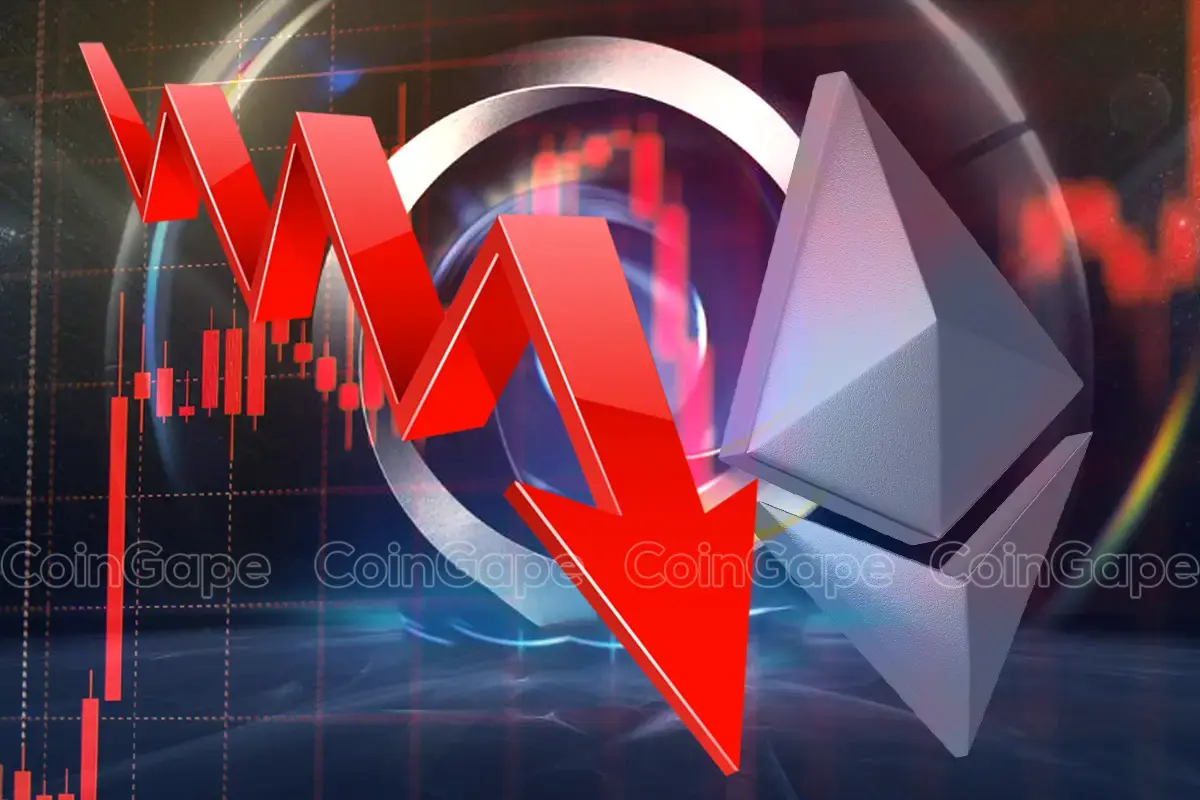
 Altcoin23 hours ago
Altcoin23 hours agoEthereum Price Threatens Decline To $1600 After Breakdown From Symmetrical Triangle
-

 Altcoin19 hours ago
Altcoin19 hours agoBitcoin Holds $83K Despite Macro Heat, What’s Happening?
-

 Bitcoin16 hours ago
Bitcoin16 hours agoBitcoin Traders’ Realized Losses Reach FTX Crash Levels — What’s Happening?
-

 Market15 hours ago
Market15 hours agoXRP High Stakes Setup: Analyst Warns Of Sharp Move To $17 Or $0.65
-

 Market14 hours ago
Market14 hours agoSEC Reconsiders Howey Test Use in Crypto Oversight











